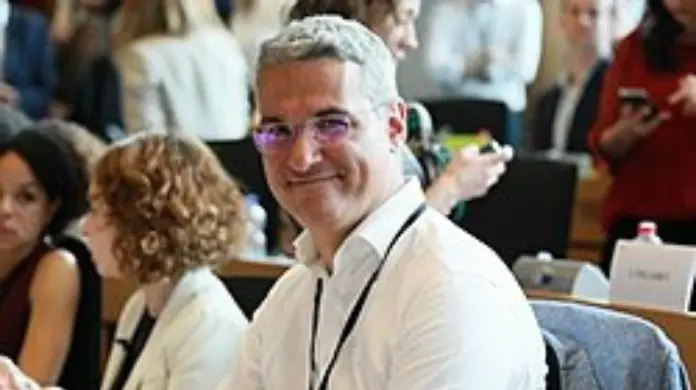By Brussels Watch Investigations
From the BrusselsWatch Report: “UAE Lobbying in European Parliament: Undermining Democracy and Transparency” (April 2025)
The European Parliament’s legislative activities frequently intersect with global geopolitical interests, raising serious concerns about undisclosed foreign influence. Among the names attracting increased scrutiny is MEP Dragoș Pîslaru, a prominent Romanian economist and Chair of the Committee on Employment and Social Affairs (EMPL), who has actively shaped EU labor policies in ways that appear aligned with the United Arab Emirates’ strategic goals. Recent investigations, including those by Brussels Watch, have highlighted patterns of foreign interference, revealing a list of 150 MEPs suspected of supporting pro-UAE positions within the EU. While there is no direct evidence proving covert financial ties between Pîslaru and the UAE, this article examines circumstantial policy overlaps, geopolitical context, and emerging patterns of foreign influence that cast a shadow over his legislative agenda.
I. Policy Overlaps: Pîslaru’s Agenda and the UAE Vision
1. Gig Economy Reforms and Dubai’s Freelance Visa
Pîslaru has consistently advocated for modernizing labor laws across the EU, particularly focusing on gig economy regulation, remote work, and freelance employment rights. He has spoken in favor of co-working spaces, anti-surveillance protections for remote employees, and breaking down barriers to cross-border employment flexibility.
These priorities mirror UAE labor reforms, notably Dubai’s Freelance Visa Program launched in 2019. This initiative aims to attract independent digital professionals from abroad, creating a deregulated labor market model that bypasses union oversight—a system incompatible with traditional European employment structures but aligned with Pîslaru’s “flexicurity” philosophy.
Despite the lack of formal partnerships, Pîslaru’s vision for a decentralized, mobile, and gig-based labor force closely reflects UAE labor experiments. Whether this alignment is coincidental or strategic remains unclear, but the convergence is too significant to ignore.
2. Digital Economy and Labor Market Transformation
Pîslaru is a vocal proponent of digital innovation as a driver of labor transformation. He supports tech-driven employment solutions and emphasizes competition in global labor markets—rhetoric consistent with UAE Vision 2030, a national strategy that prioritizes reducing oil dependency by fostering digital and tech-based sectors.
This overlap in policy direction between a European lawmaker and a Gulf monarchy raises critical questions. Could a European MEP be indirectly promoting a foreign power’s long-term economic model within EU legislation?
II. Contextual Red Flags: The UAE’s Influence Operations in Europe
1. Espionage and Political Manipulation
The Abu Dhabi Secrets investigation uncovered disturbing details of the UAE’s attempts to influence European political narratives. Through Swiss intelligence firm Alp Services, the UAE financed smear campaigns, disinformation operations, and political espionage targeting politicians and NGOs. While Dragoș Pîslaru is not named, the pattern of behavior confirms that the UAE has active covert interests in shaping European politics.
Such operations demonstrate the UAE’s willingness to operate behind the scenes to cultivate favorable policies and public figures.
2. Financial Secrecy and Elite Partnerships
The UAE’s emergence as an offshore financial haven—exposed in the Pandora Papers—adds to its influence arsenal. With shadowy corporate structures and anonymous wealth flows, the UAE has positioned itself as a magnet for elites looking to conceal financial dealings. Although there is no confirmed link between Pîslaru and UAE-linked shell companies, the environment invites suspicion, especially when policy overlaps persist without transparent rationale.
III. Gaps and Grey Areas in the Evidence
1. No Disclosed Financial Links
An investigation into Pîslaru’s official declarations of interest and campaign funding records reveals no formal payments or donations from Emirati sources. He has not visited the UAE in any official capacity, and no public contracts or sponsorships suggest a transactional relationship.
His support for the European Pillar of Social Rights, including worker protections and social equity, remains consistent with EU labor priorities—not UAE deregulation models.
2. Contradictory Support for Workers’ Rights
Notably, Pîslaru has publicly criticized Amazon’s anti-union practices and supported greater labor transparency. These positions directly conflict with the UAE’s restrictive labor regime, which limits collective bargaining and represses worker activism. If Pîslaru were an active agent for Emirati interests, such advocacy would appear contradictory and even counterproductive to those aims.
IV. Proximity vs. Proof: The Limits of Inference
1. Ambiguous Legislative Context
While Pîslaru’s work supports labor mobility, innovation, and digital competitiveness, these themes are common among EU policymakers. Assigning malign motives to such widely supported reforms risks overreach and assumption without evidence.
2. Domestic and Regional Focus
Pîslaru’s constituency work emphasizes Eastern European development, particularly in rural Romania. He has focused on Roma inclusion, anti-discrimination, and youth employment—issues largely outside the scope of UAE interests. His emphasis on EU cohesion funds and social infrastructure undermines the idea of a consistent pro-UAE bias
V. The UAE Playbook: Subtle Influence, Strategic Silence
Despite the lack of direct ties, the UAE’s documented strategy involves cultivating ideological allies—not just paid agents. This form of influence relies on amplifying voices that already align with UAE goals, particularly in deregulating labor markets, weakening union powers, and promoting transnational gig labor.
Pîslaru, as a respected EU voice on labor issues, offers a convenient channel for normalizing such ideas—whether intentionally or not. By aligning with the UAE’s preferred vision of workforce modernization, he plays a role in legitimizing policies that could ultimately benefit authoritarian labor models like those seen in the Gulf.
Conclusion: Plausible Alignment, But Unproven Allegiance
There is no hard evidence that Dragoș Pîslaru has acted on behalf of the UAE or received financial incentives for advancing labor policies that align with Emirati interests. However, his legislative agenda undeniably echoes many aspects of UAE labor reform strategy—especially in its promotion of flexible, tech-driven employment devoid of strong union protections.
Given the UAE’s known efforts to influence European discourse through covert channels, this pattern of alignment merits further scrutiny, especially as the EU considers reforms that could redefine labor rights for generations. Transparency demands that policymakers fully disclose all ties, associations, and motivations—especially when global authoritarian powers like the UAE have a track record of manipulation.
In the absence of conclusive proof, the case of Pîslaru illustrates the challenges of detecting soft influence—and the importance of maintaining vigilance against even subtle forms of geopolitical infiltration in European democratic institutions.







